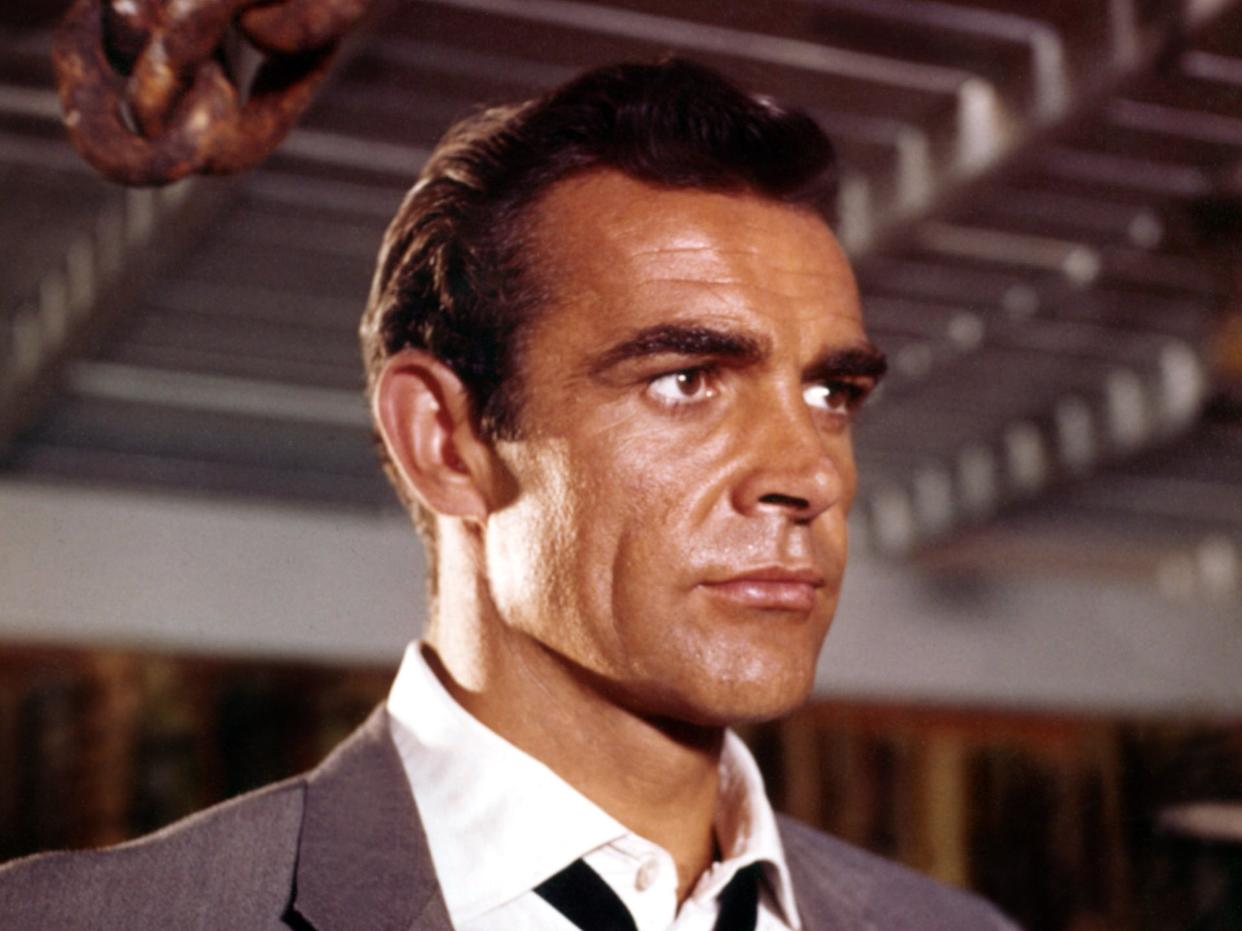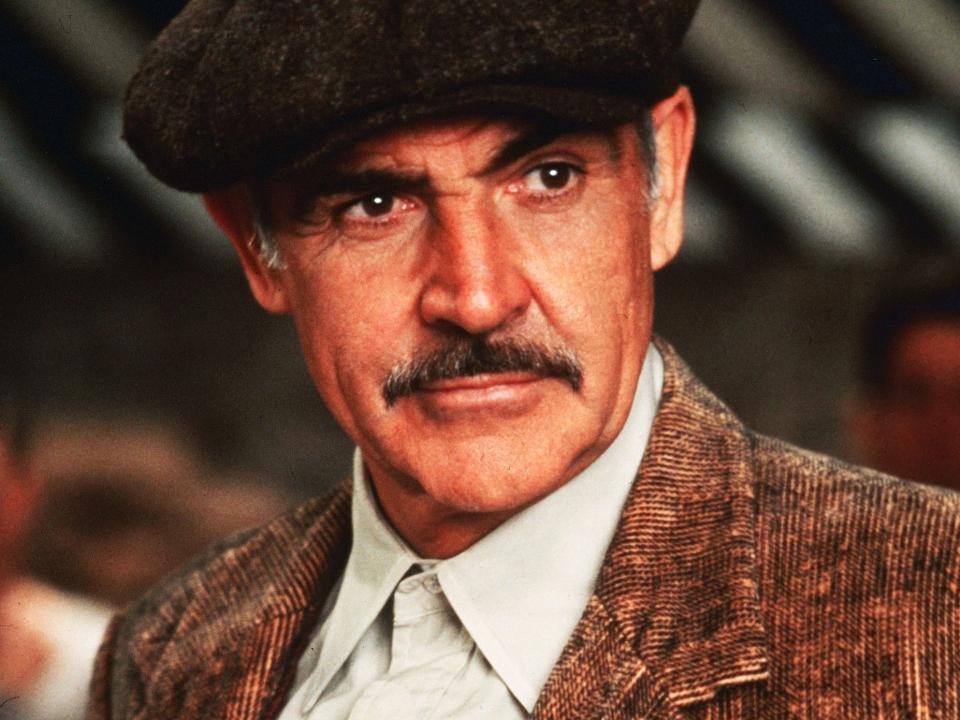Sean Connery was charismatic, contradictory – and more than just James Bond

Sean Connery grew up in an overcrowded tenement flat in Fountainbridge, Edinburgh. He left school at the age of 13 and worked as a bricklayer and cement mixer, steel bender, lorry driver and coffin polisher. He was invalided out of the navy with duodenal ulcers. It’s worth bearing this background in mind when you consider that he became, not only one of the biggest stars in post-war UK cinema, but also one of the most accomplished screen actors.
The working-class Scot wasn’t the most likely casting as Ian Fleming’s urbane spy hero James Bond, but Connery brought an edge, a hint of ironic humour, sadism and darkness to the character that stopped the early Bond pictures descending into camp.
In later years, that sadism became increasingly problematic. Connery’s first wife Diane Cilento accused him of abusing her. He caused consternation when he said it wasn’t the “worst thing to slap a woman” and then stood by the remark in a later interview. He eventually changed his perspective , commenting in 2006 that he didn’t believe “any level of abuse against women is justified” but, by then, the damage had been done. From today’s perspective, it appears beyond jarring and bizarre that one of the world’s biggest movie stars should have used such misogynistic language. That is why a certain wariness remains when discussing Connery’s monumental achievements as an actor.
“It has never been hard to tell the difference between a Scotsman with a grievance and a ray of sunshine,” PG Wodehouse famously wrote. You half suspect that he may have been thinking of Connery when he made the observation. Connery seemed driven in his private and professional life by his grudges and pet feuds. It sometimes appeared he felt everyone, whether Bond producer Albert “Cubby” Broccoli or the Scottish press or the Hollywood system, was determined to cheat against him in exactly the same way as Auric Goldfinger had done against Bond on the golf course in Goldfinger. Of course, Connery was always far too canny to let this happen.
What distinguished Connery from British stars of the 1950s was his physicality. He wasn’t one of those plummy-voiced uptight “chaps” like Kenneth More or Dirk Bogarde, who dressed in tweed jackets and appeared in Doctor in the House films. He was a former lifeguard and bodybuilder, who also studied dance for three years. Matt Busby supposedly once tried to sign him for Manchester United. He moved with grace and menace, and was at ease with his body.
It also helped that Connery’s success took a while. He was in his 30s by the time he was cast as Bond, so he was no callow juvenile lead. There was nothing deferential or nervous about him. He had the same brooding, introspective quality as American method actors like Marlon Brando, James Dean and Montgomery Clift, but none of their neuroses.
Then there was the voice, that deep distinctive drawl that Ewan McGregor and Jonny Lee Miller took such pleasure in imitating in Transpotting (1996). “Clear enough, Misssh Moneypenny.”
Regardless of the nationality of the characters Connery played, whether Soviet submarine commanders, Arab rebel leaders or MI5 spies, that voice didn’t change too much. Listen, for instance, to his most famous monologue describing the “Chicago way” in his Oscar-winning role as the Irish-American cop Jim Malone in Brian De Palma’s The Untouchables (1987).
“He pullsh a knife, you pull a gun. He shends one of yoursh to the hospital, you shend one of hish to the morgue.”

Sean Connery in ‘The Untouchables’
Rex FeaturesWhat you notice in almost all Connery’s roles is the drive and determination. Even as Bond, he would never let the gadgets, martinis and romantic dalliances get too far in the way of the real business in hand, namely smashing SPECTRE and bringing Blofeld to book.
Connery was nothing if not contradictory. He was the ardent Scottish nationalist who lived in tax exile in the Bahamas; he was the frugal, tight-fisted actor who gave away huge amounts of money to charitable causes. He was the working-class Edinburgh actor who played, not only public school boy Bond, but his share of patrician English army officers.
In the latter part of his career, Connery sometimes seemed more interested in spending time on the golf course than in making movies. Nonetheless, when he did take a role, he always showed the same absolute commitment.
Inevitably, Bond overshadowed everything else that Connery did. As tributes are paid to him this weekend, you will see that far more column inches are devoted to Dr No, Diamonds are Forever et al. than they are to his other work in the 1960s or the films he appeared in once he quit Bond.
Anyone who has doubts about his range as an actor should watch his collaborations with Sidney Lumet: as the rebellious soldier in The Hill (1965) or as the burnt-out policeman investigating a child molester in The Offence (1971). In spite of his machismo, Connery knew just how to convey defiance, moral anxiety and inner torment. Perhaps as a reaction to playing Bond, he frequently took blue-collar roles, for example as the militant miner and trade unionist in Martin Ritt’s The Molly Maguires (1970). In 1967, the year he played Bond in You Only Live Twice, he also directed The Bowler and the Bunnet (1967), a black-and-white documentary about trade unions and working practices in a shipyard on the Clyde.

Sean Connery in 1970 film ‘The Molly Maguires’
Rex FeaturesOn screen, Connery was a dark and saturnine figure, but he didn’t always take himself too seriously. He was good comic value as Harrison Ford’s bookish dad in Indiana Jones and The Last Crusade (1989). He wasn’t too grand either to play King Agamemnon in Terry Gilliam’s comic fantasy, Time Bandits (1981). At the start of his career, you’ll even find him appearing alongside leprechauns in a Disney movie, Darby O’Gill and the Little People (1959), directed by Robert Stevenson of Mary Poppins fame. As an ageing Robin Hood opposite Audrey Hepburn’s Marian in Robin and Marian (1976), he showed grace and charm.
“I believe that Connery touches us because he personifies the best qualities that came out of the post-war upheavals in Britain. The reform of education, the busting of the BBC’s monopoly and so allowed a lot of talent to flourish,” director John Boorman, who worked with Connery on one of his more eccentric films, sci-fi drama, Zardoz (1974), noted of the actor’s impact on British popular culture.
Boorman’s remarks hint at why Connery is such an enduring and important figure in UK cinema history. He was an outsider who had such authority that everyone deferred to him. He shattered class distinctions. He also had gravitas and charisma, a combination that was the making of both the Bond franchise and of his own illustrious career.
Read more
Sean Connery's 10 greatest roles


